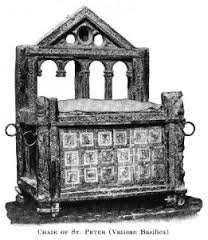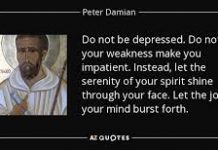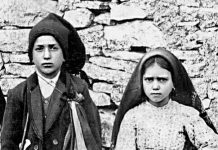All manifestations of God, like the Blessed Sacrament, are concealments as well. Everywhere God is veiled; Everywhere he works underground; Everywhere he sets up a screen between himself and the observation of his creature; Everywhere, search is the law of earth and vision the law of heaven; Everywhere in this world, to believe is to see, and seeing is not believing. This is God’s way. … It is not best only for us, but simply necessity. – Fr. Faber, The Blessed Sacrament
I’d be lying if I said that I have never asked God why He does things—never shook my fist at the heavens in a moment of anger demanding to know what exactly I’d done to deserve whatever particular cross—and to know why suffering has to happen at all. One of those moments happened a few weeks ago when some dear friends lost a beloved child. It was one of the most heartbreaking funerals I have been to, seeing the raw, unadulterated pain of the grieving.
The thing about death is that it dredges up the grief present in every person’s life: grief for losses ancient or fresh. We feel terrible for the family, but we grieve our brother who has run away from home, our mother who has died, our hopeless diagnosis of advanced Lupus. And so it was that the funeral brought all of my own crosses to the forefront.
And while I didn’t necessarily have a crisis of faith, the Lord and I had some words. Heated words. It occurred to me that I was addressing the God of the Universe as if he owed me a list of explanations, starting with why he allows bad things to happen to good people and ending with where did our wedding video go. I was tired of looking through pain to see the Face of God. I wanted him, for once, to come clean and show me all his cards.
But as Father Faber reminded me, that’s simply not the way the Lord works. God’s way is concealed and veiled—and, I would add, especially within suffering and hardship. This is God’s way (and he might as well have added, “not your way, dummy”). Why? C. S. Lewis wrote that pain is God’s “megaphone to rouse a deaf world.” When we are in pain, God insists on being “attended to” as he “shouts to us.” We can no longer ignore Him because it hurts. Badly. And when we’re hurting, we turn to Him. (Everyone but the staunchest of atheists does, at least—and maybe in their weakest and saddest moments, they do too.)
After every school shooting or earthquake or flood there is a flurry of blogs and op ed’s entitled, “Why bad things happen to good people.” There are prayer services and scripture readings and intentions offered up. We all want to know why and how these horrible things could have happened or, rather, why and how someone (God) could have allowed them to happen. So we ask Him. We rage at Him. And somehow, in those moments, He holds us to strengthen us. He speaks love and forgiveness to us and through us, if we let Him. And He gives us an opportunity to know ourselves better and to grow in wisdom and faith.
But best of all, in those moments he gives us an opportunity to know him better. At the side of a suffering child, a parent will glimpse the fatherhood of God. Struggling with the past, an alcoholic will grasp the Lord’s forgiveness. The knowledge of God accompanies the pain, just as the Resurrection follows the Crucifixion. This is God’s way.
I can’t say that God showed me his cards. He didn’t give me strange and wonderful insights into suffering that haven’t already been more than adequately laid out by others. I still don’t truly understand why suffering and death must be a part of life or why my wedding video is persistently nowhere to be found. But what I do know of the Lord is that He is kind. He longs to communicate with us by any means possible. When we pray, His Generosity overflows as if He couldn’t have waited a second longer for us to ask. His forgiveness is something I cannot live without. Only a being of the purest Love could create something as precious and smooshy as a chubby little baby all swaddled up for sleep. This doesn’t make my Golgotha any easier, but it gives me the strength I need to walk my own personal way of the cross.











